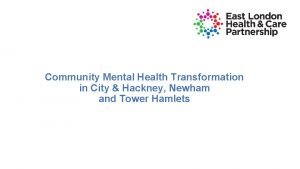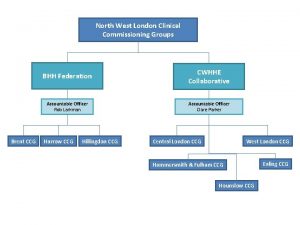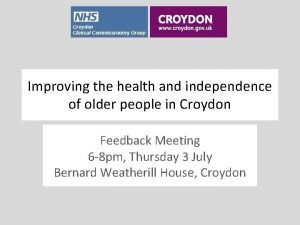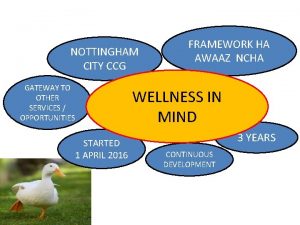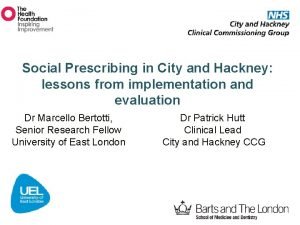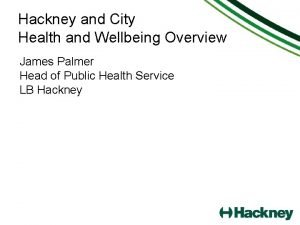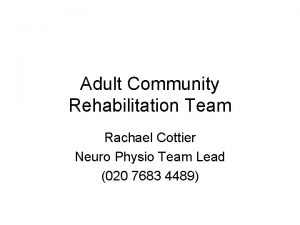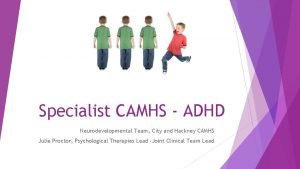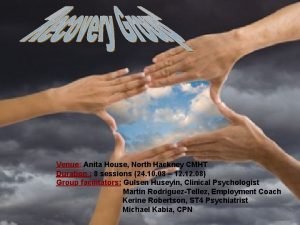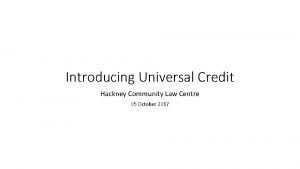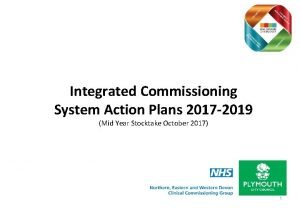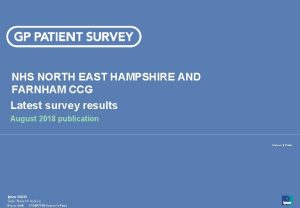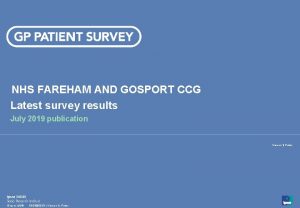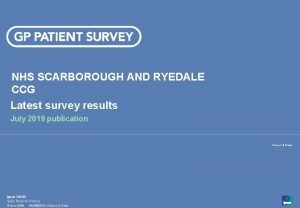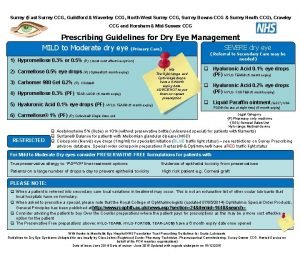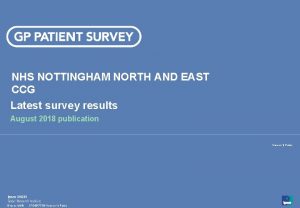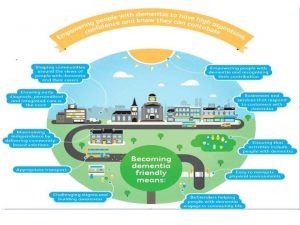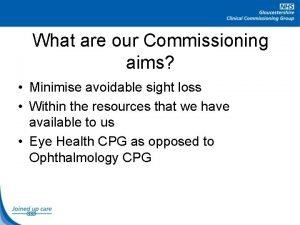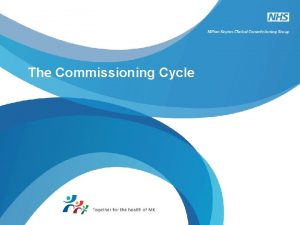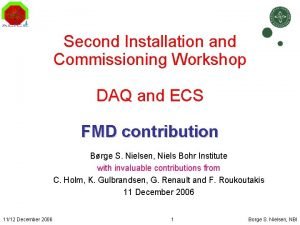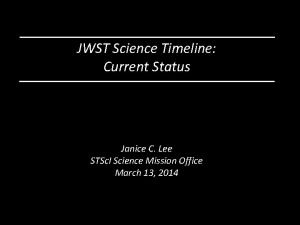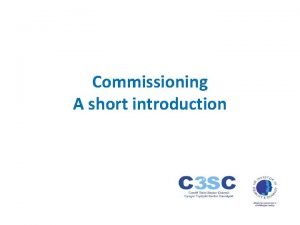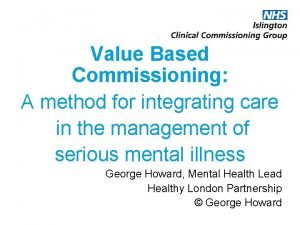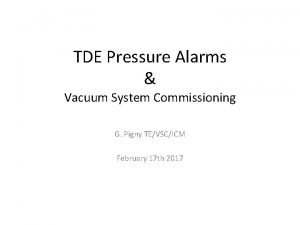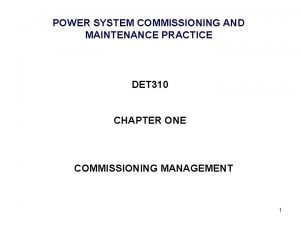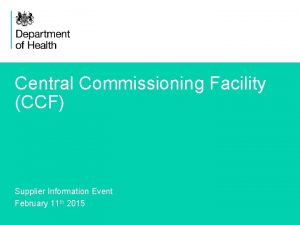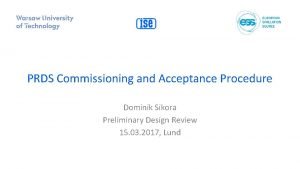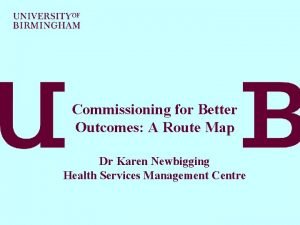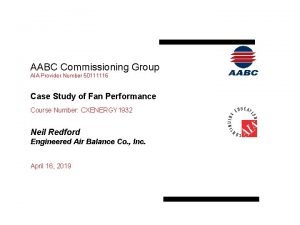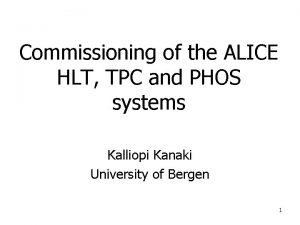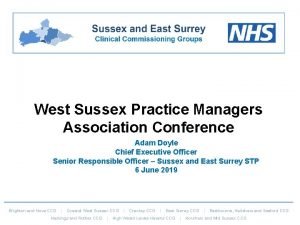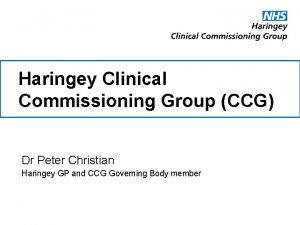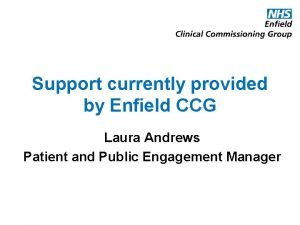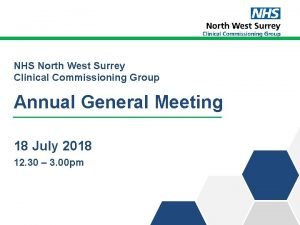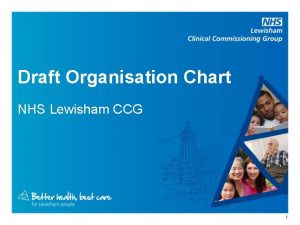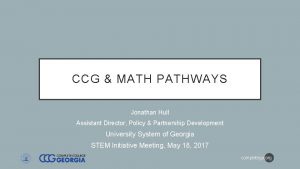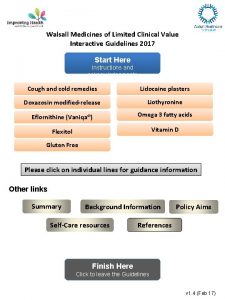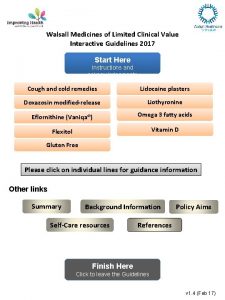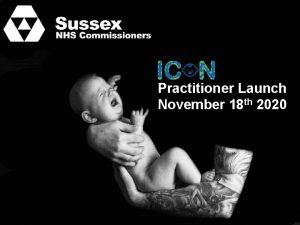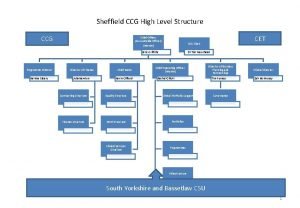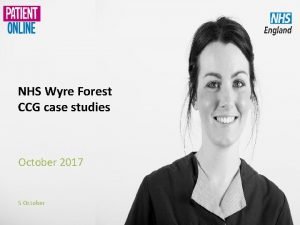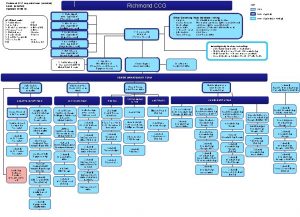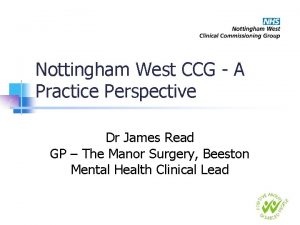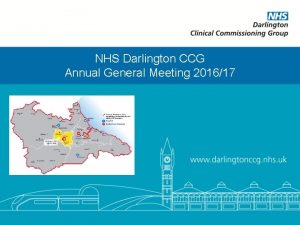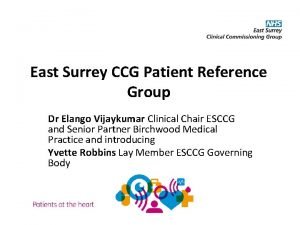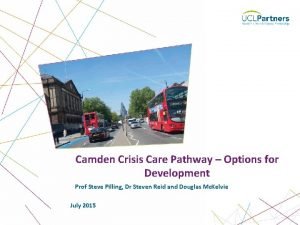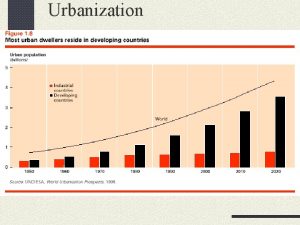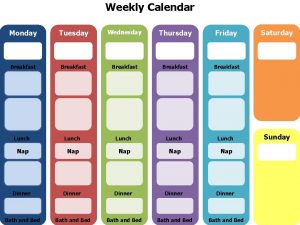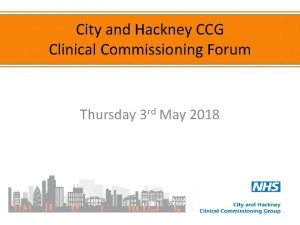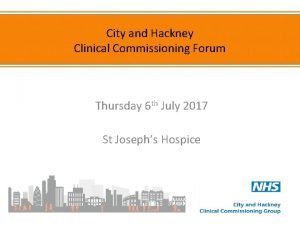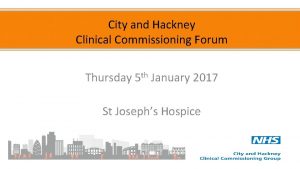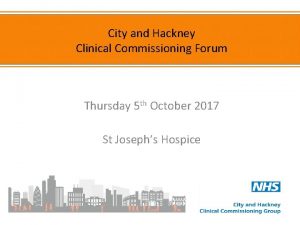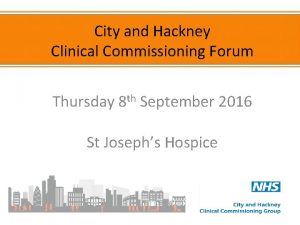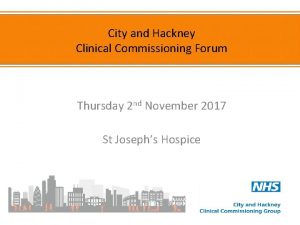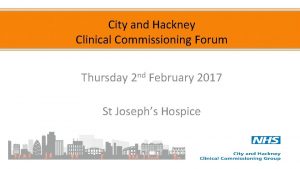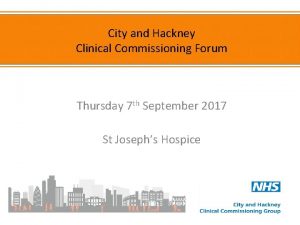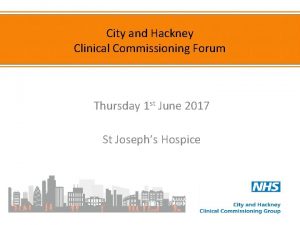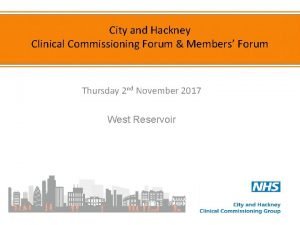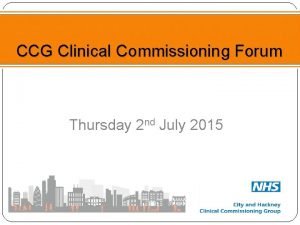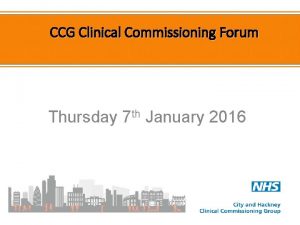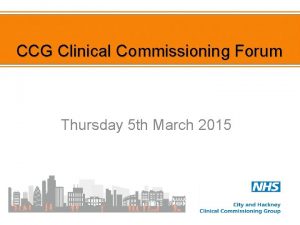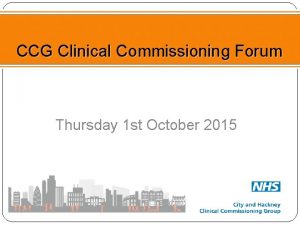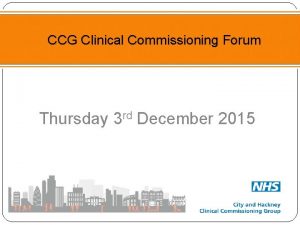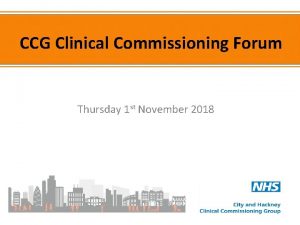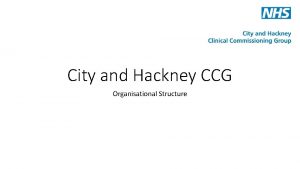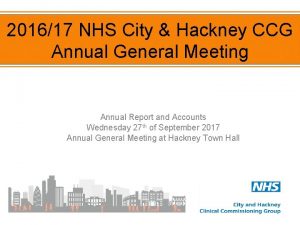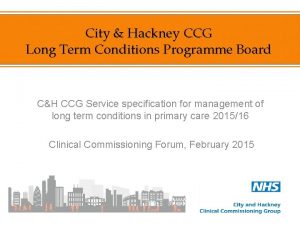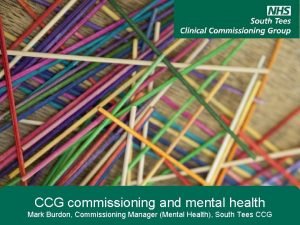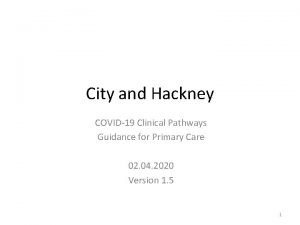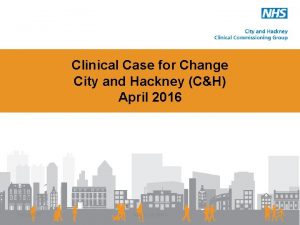City and Hackney CCG Clinical Commissioning Forum Thursday





































































- Slides: 69

City and Hackney CCG Clinical Commissioning Forum Thursday 1 st February 2018

Agenda Items Led by 1. Welcome Clare Highton Homerton update 2. Tracey Fletcher 3. Neighbourhoods Jennifer Walker 4. Clinical Leadership Gary Marlowe/Clare Highton Prescribing update: 5. • • • 6. Draft 2018/19 Prescribing CCE Contract NHSE Consultation on OTC items not to be routinely Prescribed Review of options for Prescribing Computer Decision Support Systems e. RS update Rozalia Enti Kathy Adams

Homerton Update Tracey Fletcher

End

Neighbourhood Model Hackney and City CCF February 2018

Why have we developed the neighbourhood model? • Part of the response to financial and activity pressures • Supporting, protecting and strengthening excellent primary care services • Sustainability • Scope for better integration of services

What is a neighbourhood? • “A community” • Involving populations of between 30, 000 and 50, 000 • A focus on personalisation of care and population health • Clusters of GP surgeries working closely together at the foundation • Working closely together with other services • Integrated workforce • A platform to deliver change • Using excellent integrated local data (health, social care, mental health)

How did we design the neighbourhood model? • Using evidence from locality/network models from similar demographic areas in London “Satisfaction rates with Evidence and feedback from • Islington, Tower Hamlets, Camden adult social care services two pilot sites in 2015 was have increased this year encouraging. This led to the and are higher than the roll-out of networks across average rates in London. Islington in 2016. There are now 12 networks in place. An In addition, 82 percent of patients supported evaluation in September through our integrated 2017 showed that networks care teams report that have led to a they helped write their significant reduction in A&E care plan”. attendances and admissions. The borough-wide team has supported about 250 patients in its first year. Current results from 93 patients show an increase of 7 per cent in the number of days they were able to spend at home in the six months after receiving support. The impact of this has been: a 51. 8 per cent reduction in emergency bed days; a 47. 7 per cent reduction in accident and emergency attendances; and a 32. 9 per cent reduction in first and follow up outpatients’ appointments.

How did we design the Neighbourhood model ? • Emerging evidence from Primary Care Home: • Developed by National Association of Primary Care • 15 rapid test sites since Oct 15 • Ongoing reductions in emergency admissions • See Larwood & Bawtry (Dr Steve Kell) • Learning from One Hackney & City • Detailed consultation with all providers

What has happened to date? • Late 2016 • CCG workshops – considering post One Hackney & City development of quadrant model • Early 2017 • Literature review, evidence gathering suggested smaller locality model of neighbourhoods • July 2017 • Workshop held to test concept with all providers • July to November 2017 • Significant engagement process across providers to test model and get feedback • Late 2017 • Steering Group and UPCB signed off principles of a neighbourhood model • Transformation Board signed off principles • Business Case approved at Transformation Board and IPCB • January to August 2018 • Detailed planning and design phase for launch of neighbourhood model • August 2018 • Expected Go Live of first “ready” neighbourhood

What do we think the benefits will be for patients and staff in primary care? • Improved multi-disciplinary care for complex patients • Improved staff morale • Recruitment and retention • Platform for creativity • Creating leadership and conversations at a local leadership level using integrated local data • Improvements in quality • Accelerates IT solutions • Empowering voluntary sector and building social capital • Stronger local resident voices and engagement

What changes could be delivered through neighbourhoods? • Neighbourhoods will evolve and we expect over time that they will support changes such as the ones below: Case finding/risk stratification and case management model Voluntary sector model Public Health Outcomes Improved MDT working Support safeguarding A way to help manage cross boundary patients Structure for increased resident involvement in care Approach to housing New ways of accessing secondary care services

What next? • Nine Months of detailed design and listening • Happy to come to consortia meetings if helpful • Mental Health workshop • 28 th February 2018 QUESTIONS/FEEDBACK

End

Clinical input into the ACS Dr Clare Highton

Clinical input into the ACS Dr Clare Highton

ACS Workstreams Planned Care Children, Young People and Maternity Unplanned Care Prevention Each workstream has: • • 1 7 Senior Responsible Officer (SRO) Workstream Director Clinical Lead (s) Patient Lead (s)

Redesign – testing of ideas clinically Formerly • Clinical Commissioning Forum • Consortia Programme Boards (GP Chair) • Executive • Provider clinicians 1 8

Proposed Workstream (SRO Chair) • Clinical Commissioning Forum - still has a role? • Consortia or Neighbourhoods? Or both? • Executive • Provider clinicians 1 9 System practitioner cabinet

Practitioner Cabinet 2 0 • Workstream Clinical and Practitioner Leads • Organisation Leads (e. g. Managing Director, ND and Chairs) • Not decision making

• • • 2 1 Debate and challenge workstream proposals Link to workforce Link to education Advise on outcome measures Develop clinical strategy and consensus

End

Prescribing Update Rozalia Enti Draft 2018/19 Prescribing CCE Contract • NHSE Consultation on OTC items not to be routinely Prescribed • Review of options for Prescribing Computer Decision Support Systems •

Prescribing Programme Board 2018/19 CCE Prescribing work plan Rozalia Enti Assistant Director Medicines Management NHS City& Hackney CCG

Key Changes to the 2018/19 CCE prescribing work plan Entry criteria • Sodium valproate- practices must READ code contraceptive advice given to women & girls of child bearing age being prescribed sodium valproate • Error reporting via National Reporting and Learning System (NRLS) - part of the entry criteria Audits • AF re-audit • Respiratory audit (includes practice review of recommendations for 10 -20 patients by the respiratory pharmacist) • Repeat prescribing (reviewing prescriptions ordered through community pharmacies & directly through practices) Training • Polypharmacy & deprescribing New Indicators • Blood glucose testing strips cost per 1, 000 QOF registered patients with diabetes aged >17 yrs • Gabapentin & pregabalin – volume indicator • Sip feeds cost per 1, 000 patients • MOLV list cost per 1000 patients [↓]

Clinical Commissioning and Engagement Contract (CCE) 2018/2019 The prescribing elements of the CCE will be delivered by practices in conjunction with their practice support pharmacists and facilitated by templates developed by the medicines management team. Details of the proposed scheme are in the table below. 2018/19 Medicines work stream of Evidence to be submitted Payment Responsibility for the activity / submission Clinical Commissioning and Engagement Contract Section A: Entry Level for CCEC - Prescribing 1. The practice will meet the prescribing advisor at least three (3) times during the financial year. a. 1 st meeting (annual prescribing visit) must be undertaken by 29 th June 2018. The focus of this meeting is action planning for 2018/19 & explain requirements for prescribing work plan b. The practice will in addition to 1 a, have two (2) subsequent meetings to include progress & feedback on: • Prescribing Performance during previous 12 months • QIPP progress • Audits • Script. Switch/ or equivalent CDSS c. The practice will send to the CCG MMT, at least bi-annually, a register of ALL prescribers outlining current prescribers, leavers and joiners to the practice. Copy of Post-Visit Letter from Practice Pharmacist including agreed action points 2 6 PSP to prepare data and post visit letter Practice’s submission of action points agreed at these 2 meeting Q 3 2018/19 CEG must show 100% documentation on EMIS of advice given to women and girls of child bearing age. If there any exclusion for patients’ receiving advice then the reasons should be clearly documented GP Practice Prescribers in the practice (including Lead GP) to attend the annual prescribing visit meeting and incorporate recommendations into practice. GP Prescriber to meet PSP and have at least two (2) further meetings with PSP to agree recommendations Practice register of ALL prescribers. Submission dates: 27 th July 2018 and 31 st January 2019 d. The practice will have 100% documentation on EMIS of advice given to women and girls of child bearing age on the risk of valproate treatment to the unborn child in pregnancy; and emphasise the need for effective contraception planning. Practices will use specific READ CODES in their documentation of advice given to patients Practice Support Pharmacist (PSP) PSPs to collate list of ALL prescribers from Practice Managers (PMs) Part of Core CCE Contract PSPs to: 1. Identify female patients of child bearing age without documentation of any advice on risk of valproate being given 2. direct practices to the MHRA valproate toolkit for practice to review and implement relevant actions PM to provide PSPs with list of current prescribers within the practice at least biannually. The practice should review the CCG’s Non-Medical Prescriber policy (2017) and make note of their responsibilities and the recommendations made within it GP responsible for: 1. Practice’s prescribers being familiar with: MHRA resources (including consultation checklist) on sodium valproate 2. Implementing MHRA advice and ensuring all female patients of child bearing age have relevant documentation of pregnancy advice Practice members are required to note the recommendations that have been made in the summary and incorporate recommendations into practice.

Clinical Commissioning and Engagement Contract (CCE) 2018/2019 The prescribing elements of the CCE will be delivered by practices in conjunction with their practice support pharmacists and facilitated by templates developed by the medicines management team. Details of the proposed scheme are in the table below. e. Error reporting and risk management. Prescribing and Medication Error Reporting Each practice must report prescribing and medication related errors via the National Reporting and Learning System (NRLS). Practices should tick the relevant box on the NRLS website to enable sharing of at least ONE of the errors submitted with the CCG. Deadline for submissions for, NRLS notifications and the learning & action plan: Part of Core CCE Contract 22 March 2019 Payment Section B: Audit Levels for CCEC - Prescribing 2. Bi-annual submission of Reviews of Prescribing data on ‘Restricted Prescribing List’ Review data on: Dressings Hospital only/ Non-Formulary Specials Each Practice must submit data outcomes forms, no later than Practice support pharmacist time provided by the CCG 27 th July 2018 (review of latest 3 month data) 31 st January 2019 (review of latest 3 month data) & incentive of (TBC 0. 5 p per registered patient) for prompt submission of Practice’s Data Outcomes Forms 3. Clinical Audit 1 Medicines Management Receipt of data from Re-audit by 29 th June 2018 Practice support pharmacist time provided by the CCG Each Practice must submit a Summary report which outlines what the Learning from the Re. Audit has been & the Practice’s Action Plan, no later than 29 th June 2018 & incentive of (TBC 1 p per registered patient) for prompt submission of Practice’s Learning & Action Points 2 7 Practices are required to input the details of at least FOUR errors into the NRLS database. Practices should tick the box that enables sharing of the error with the CCG before submitting the error online. The practice should notify the PSP of the medication/prescribing errors entered into the database in order for the PSP to document the discussions and outcomes relating to the errors. [The PSP’s ability to contribute to this workstream is highly dependent on practice notifying PSP of errors] Practice members are required to actively engage with the PSP to produce at least ONE summary of learning and action points from the errors. 2018/19 Medicines work stream of Evidence to be submitted Clinical Commissioning and Engagement Contract Atrial Fibrillation re-audit - ensuring appropriate prescribing in patients with atrial fibrillation (non-valvular) who have a CHA 2 DS 2 VASc score of ≥ 2 for women and ≥ 1 for men. PSPs will facilitate the development and submission of a summary of the outcomes of the practice discussions of ONE of these errors. Responsibility for the activity / submission Practice Support Pharmacist (PSP) The PSP will facilitate the review of data and make recommendations to the practice The PSP will undertake the necessary searches, facilitate the review of data and make recommendations to the prescribers. The PSP will facilitate the completion of the paperwork. The PSP and Lead GP will sign the completed paperwork. The paperwork should be submitted to the CCG MMT for the re-audit. GP Practice members are required to note the recommendations that have been made in the summary and incorporate recommendations into practice The prescribers in the practice (including Lead GP) are required to meet with the PSP and agree on recommendations made. These recommendations should then be incorporated into practice. There should be evidence that patients highlighted as needing a particular intervention in the initial AF audit have been reviewed by the practice.

Clinical Commissioning and Engagement Contract (CCE) 2018/2019 The prescribing elements of the CCE will be delivered by practices in conjunction with their practice support pharmacists and facilitated by templates developed by the medicines management team. Details of the proposed scheme are in the table below. 2018/19 Medicines work stream of Evidence to be submitted Payment Responsibility for the activity / submission Clinical Commissioning and Engagement Contract Section B: Audit Levels for CCEC - Prescribing Practice Support GP Practice Pharmacist (PSP) 4. Clinical Audit 2 Medicines Management Receipt of: Respiratory audit a. Audit: 26 th October 2018 b. Re-Audit: 31 st January 2019 Part A- Audit to ensure optimisation of medicines use in the management of asthma Each Practice must submit a Summary report which outlines what the Learning from the Part B- Respiratory review of 10 Asthma and Audit & the Practice’s Action Plan, no later than dates specified. 10 COPD patients by specialist respiratory pharmacist via virtual clinic. Practice support pharmacist time provided by the CCG & incentive of (TBC 1. 5 p per registered patient) for prompt submission of Practice’s Learning & Action Points Summary of Learning and Action Points from Audit: 26 th October 2018 The PSP will undertake the necessary searches, facilitate the review of data and make recommendations to prescribers. The PSP will facilitate the completion of the paperwork. The PSP and Lead GP will sign the completed paperwork. The paperwork should be submitted to the CCG MMT for both the initial audit and the re-audit. The prescribers in the practice (including Lead GP) are required to meet with the PSP and agree on recommendations made. These recommendations should then be incorporated into practice. The prescribers in the practices will action the recommendations of the respiratory pharmacist and reflect on their learning from these recommendations. Re-Audit: 31 st January 2019 5. Polypharmacy training 6. Non Clinical Audit Review of Repeat Prescribing processes in GP practices and Community Pharmacies- To determine whether reordering of prescriptions in line with City and Hackney CCG “Repeat Prescribing Policy” 2 8 Each Practice must have one GP participate in Presc. QIPP polypharmacy and deprescribing e-learning: https: //www. prescqipp. info/resources/cat egory/304 -polypharmacy-gp-trainingmaterials Summary of Learning and Action Points from Audit: 23 rd November 2018 TBC 0. 5 p per registered patient PSP will facilitate the completion of paperwork (summary of learning and action points) Each Practice must submit a Summary report which outlines what the Learning from the Audit & the Practice’s Action Plan, no later than dates specified. Practice support pharmacist time provided by the CCG The PSP will undertake the necessary searches, facilitate the review of data and make recommendations to the prescribers. Summary of Learning and Action Points from Audit: 15 th February 2019 & incentive of (TBC 1. 5 p per registered patient) for prompt submission of Practice’s Learning & Action Points The PSP will facilitate the completion of the paperwork. The PSP and Lead GP will sign the completed paperwork. The paperwork should be submitted to the CCG MMT for both the initial audit and the re-audit. GPs to undertake e-learning and submit Practice’s Learning & Action Points and evidence of GP leading on this disseminating the teaching to other prescribers GP to submit Summary of Learning and Action Points The prescribers in the practice (including Lead GP) are required to meet with the PSP and agree on recommendations made. These recommendations should then be incorporated into practice. Practice to arrange follow up discussion with local community pharmacies

Clinical Commissioning and Engagement Contract (CCE) 2018/2019 The prescribing elements of the CCE will be delivered by practices in conjunction with their practice support pharmacists and facilitated by templates developed by the medicines management team. Details of the proposed scheme are in the table below. 2018/19 Medicines work stream of Clinical Commissioning Evidence to be submitted Payment and Engagement Contract Section B: Audit Levels for CCEC - Prescribing 7. The Practice will actively engage in the Medicines QIPP Agenda & reach stipulated thresholds [Threshold figures to be announced later] MMT will: provide QIPP dashboard at least quarterly Practice will review prescribing against QIPP indicators, demonstrate improvements and reach thresholds for the 10 indicators below: v. Antibacterial items per STAR PU [↓] v. Cephalosporins, Co-amoxiclav & Quinolones as % of all antibacterial items [↓] v. Number of prescription items for trimethoprim for patients >70 years [↓] v. Emollients Cost per 1, 000 patients [↓] v. Least costly low/moderate dose ICS/LABA inhaler as a % of all low/moderate dose ICS/LABA inhalers[↑] v. Low and moderate dose ICS/LABA items as a % of all ICS/LABA [↑] v. Blood glucose testing strips cost per 1, 000 QOF registered patients with diabetes mellitus aged over 17 v. Gabapentin & pregabalin vol per 1, 000 Total Analgesics COST based STAR PU [↓]- v. Sip feeds cost per 1, 000 patients [↓ v. MOLV list cost per 1000 patients [↓]- TBC 2 9 Dashboard Quarter 4 2018/19 Dashboard with e. PACT data Q 4 2018/19 data will be available in June 2019 Practices are encouraged to access monthly data and then review their current QIPP status on the secure site of the Prescribing site TBC 5 p per registered patient for achieving each of the 10 prioritised indicators, so max total 50 p per registered patient for achieving all 10 indicators

**New** Conditions for prescribing incentive payments New- Conditions for prescribing incentive payments 8. Prescribing within budget allocation Evidence of staying within budget allocation (using March 2019 e. PACT forecasts) Practices from 2018/19 are required to come within their budget allocation. Evidence of remaining within budget allocation. Practices must take active steps to identify risk of overspend within their practice. Previous years spend against allocation to provide indication of risk of overspend. Practices identified as forecasting an overspend must: 1. 2. 3. 4. 3 0 Meet with PSP to agree action plan to address overspend (April 2018 -June 2018) Have follow up with PSP by 31 st August 2018 to review progress against action plans and impact on spend. Where budget forecasts still suggest overspend the practice will have a 3 rd visit and subsequent 4 th visit to discuss this 3 rd visit by GP consortia lead plus member of the medicines management team by 31 st October 2018 4 th visit by CCG’s GP lead for prescribing and the Head of Medicines Management by 31 st December Practices will be incentivised to prescribe within their allocated prescribing budget. (*Refer to the table in the next slide for conditions for CCE payments in relations to practices’ achievement against prescribing budget) PSPs to submit action plan post 1 st/2 nd visit to MMT All action plans to be submitted to PPB Prescribers to attend budget review meetings and implement agreed recommendations

**New** Conditions for prescribing incentive payments Achievement against prescribing budget Payment Budget underspend or ≤ 1% overspend Full payment of prescribing CCE contract Budget overspend of ≥ 1% to 5% 90% payment of prescribing CCE contract Budget overspend of >5% to 10% 80% payment of prescribing CCE contract Budget overspend of >10% to 15% 70% payment of prescribing CCE contract Budget overspend of >15% to 20% 60% payment of prescribing CCE contract Budget overspend of >20% 50% payment of prescribing CCE contract Max 55 p per registered patient for all work within the Medicines Work Plan submitted to CAHCCG. Cityand. Hackney. Medicines@nhs. net by due dates

Conditions for which over the counter (OTC) items should not routinely be prescribed in primary care Rozalia Enti Assistant Director Medicines Management NHS City& Hackney CCG

Background Practices may recall a national consultation, led by NHSE-NSCC on items which should not routinely be prescribed in primary care NHSE-NHSCC which run from July-Oct 2017 [MOLV-LIST] This paper here outlines the 2 nd ‘wave’ of national consultation running till March 2018 This current consultation sets out proposals for national guidance for CCGs on over the counter (OTC) products for 35 minor and/ or self-limiting conditions Who is leading on this work? NHSE and NHS Clinical Commissioners have established a joint clinical working group with representatives from national stakeholders including: • Royal College of General Practitioners, Royal Pharmaceutical Society, • the BMA, NICE, MHRA • Department of Health, CCG representatives, Presc. Qi. PP Stakeholders who were involved in this proposal Patient Association, National Voices and Health. Watch England

Background What are we asking of general practice members? Please review the documents underpinning the national consultation available at: - https: //www. engage. england. nhs. uk/consultation/over-the-counter-items-not-routinely-prescribed/ The Prescribing Programme Board seeks to: 1. Raise awareness on the national consultation on “Conditions for which over the counter items should not routinely be prescribed in primary care: A consultation on guidance for CCGs” 2. Listen to feedback / comments / concerns from prescribers, CCG Committees about the proposals We are also: • Continuing discussions through Joint Prescribing Group • Raising awareness with local patient/ public groups • Reviewing what the local minor ailment scheme offers

What is the issue being tackled In the year prior to June 2017, the NHS spent approx. £ 569 M on prescriptions for products for minor ailments which could otherwise be purchased over the counter (OTC) These prescriptions include items for a condition: a. That is considered to be self-limiting & so does not need treatment as it will heal of its own accord b. Which lends itself to self-care, i. e. that the person suffering does not normally need to seek medical advice and can manage the condition by purchasing OTC items OR items: c. That can be purchased OTC, sometimes at lower cost than that which would be incurred by the NHS (e. g. antisickness tablets OTC costs- £ 2. 18, cost of tablets +dispensing to NHS £ 3. 00, total actual cost to the NHS including GP consultation & other admin costs >£ 35) d. For which there is little evidence of clinical effectiveness By reducing spend on treating conditions that are self-limiting or which lend themselves to self-care, these resources can be used for higher priority areas that have a greater impact for patients, support improvements in services & deliver transformation that will ensure the long term sustainability of the NHSE estimates that restricting for minor conditions may save up to £ 136 M once discounts and clawbacks have been accounted for A wide range of information is available to the public on subjects of health promotion & management of minor self treatable illnesses through the Self Care Forum & NHS Choices & through community pharmacies, many of which are opened extended hours and at week ends

General Exceptions For the category of conditions identified as being appropriate for self-care, this guidance is intended to encourage people to self-care for minor illnesses as the first stage of treatment. Clinicians should continue to prescribe taking account of: NICE guidance as appropriate for the treatment of long term conditions (e. g. regular pain relief for chronic arthritis or treatments for inflammatory bowel disease), for the treatment of more complex forms of minor illnesses (e. g. severe migraines that are unresponsive to over the counter medicines) and for those patients that have symptoms that suggest the condition is not minor (i. e. those with red flag symptoms such as cough lasting longer than three weeks. ) Treatment for complex patients (e. g. immunosuppressed patients) and patients on treatments that are only available on prescription should continue to have these products prescribed on the NHS. Patients prescribed OTC products to treat an adverse effect or symptom of a more complex illness and/or prescription only medications should continue to have these products prescribed on the NHS. CCGs should ensure that community pharmacists are reminded of ‘red flag’ symptoms for patients presenting with symptoms related to the conditions covered by this consultation. GPs and/or pharmacists should refer patients to NHS Choices, the Self Care Forum or NHS 111 for further advice on when they should seek GP Care. Prescriptions for the conditions listed in this guidance should also continue to be issued on the NHS for: Circumstances where the product licence doesn’t allow the product to be sold over the counter to certain groups of patients. This may vary by medicine, but could include babies, children and/or women who are pregnant or breast-feeding. Community Pharmacists will be aware of what these are and can advise accordingly. Patients with a minor condition suitable for self-care that has not responded sufficiently to treatment with an OTC product. Patients where the clinician considers that the presenting symptom is due to a condition that would not be considered a minor ailment. Circumstances where the prescriber believes that in their clinical judgement, exceptional circumstances exist that warrant deviation from the recommendation to self-care. Patients where the clinician considers that their ability to self-manage is compromised as a consequence of social, medical or mental health vulnerability to the extent that their health and/or wellbeing could be adversely affected if left to self-care.

Consultation Questions A. Equality and health inequalities Do you feel there any groups, protected by the Equality Act 2010, likely to be disproportionately affected by this work? Do you feel there is any further evidence we should consider in our proposals on the potential impact on health inequalities experienced by certain groups? B. Proposals for CCG commissioning guidance Do you agree with the three proposed categories for [items] or [conditions] as below: An item of low clinical effectiveness, where there is a lack of robust evidence for clinical effectiveness; A condition that is self-limiting and does not require medical advice or treatment as it will clear up on its own; or A condition that is a minor illness and is suitable for self-care and treatment with items that can easily be purchased over the counter from a pharmacy C. Do you agree with the general exceptions proposed? D. Should we include any other patient groups in the general exceptions? E: Drugs with limited evidence of clinical effectiveness Do you agree with the recommendation to: Advise CCGs to support prescribers in advising patients that [item] should not be routinely prescribed in primary care due to limited evidence of clinical effectiveness? Please see Table 1. F: Self-limiting conditions Do you agree with the recommendation to: Advise CCGs to support prescribers in advising patients that a prescription for treatment of [condition] should not routinely be offered in primary care as the condition is self-limiting and will clear up on its own without the need for treatment? Please see Table 1. G: Minor ailments suitable for self-care Do you agree with the recommendation to: Advise CCGs to support prescribers in advising patients that a prescription for treatment of [condition] should not routinely be offered in primary care as the condition is appropriate for self-care? Please see Table 1.

Table: 1 Conditions within scope of current national consultation Category Area 1 Probiotics 1 Vitamins & minerals 2 Acute sore throat 2 Cold sores 2 Conjunctivitis Coughs & colds & nasal 2 congestion NHS annual spend £ 1, 100, 000 Exceptions See NHSE guidance for list of general exceptions £ 1, 300, 000 £ 4, 500, 000 Example products Insufficient clinical evidence to support prescribing of probiotics within the NHS for the treatment or prevention of diarrhoea of any cause. ACBS approved indication or as per local policy Probiotic sachets Does not apply to Healthy Start Vitamins (not Insufficient high quality evidence to demonstrate the currently prescribed on NHS Rxn) Iron clinical effectiveness of vitamins & minerals. They do not deficiency anaemia have to go through the strict criteria laid down by the Demonstrated vitamin D deficiency (NB not Medicines and Health Regulatory Authority (MHRA) to maintenance) confirm their quality, safety and efficacy before reaching Calcium & vitamin D for osteoporosis £ 48, 100, 000 the market. Malnutrition including alcoholism There is little evidence to suggest that treatments such as lozenges or throat sprays help to treat the cause of sore throat and patients should be advised to take simple painkillers and implement some self-care measures such < £ 100, 000. 00 as gargling with warm salty water instead. No exceptions have been identified Cold sores caused by the herpes simplex virus usually clear up without treatment within 7 to 10 days. To be effective, these treatments should be applied as soon as the first This guidance does not apply to complex signs of a cold sore appear. Using an antiviral cream after patients (i. e. immunocompromised patients) < £ 100, 000. 00 this initial period is unlikely to have much of an effect. No exceptions have been identified Treatments for conjunctivitis can be purchased over the counter however almost half of all simple cases of conjunctivitis clear up within ten days without any treatment. £ 500, 000 No exceptions have been identified Cradle cap (seborrhoeic 2 dermatitis – infants) Rationale Most colds start to improve in 7 to 10 days. Most coughs clear up within 2 -3 weeks. Both conditions can cause nasal congestion. Neither condition requires any treatment. No exceptions have been identified Cradle cap is harmless and doesn’t usually itch or cause discomfort. It usually appears in babies in the first two months of their lives, and clears up without treatment within weeks to a few months. No exceptions have been identified Vitamin B Compound tablets, Vitamin C effervescent 1 g tablets, Multivitamin preparations Lozenges or throat sprays Antiviral cold sore cream Antimicrobial eye drops and eye ointment Cough mixtures or linctus, Saline nose drops, Menthol vapour rubs, Cold and flu capsules or sachets Emulsifying ointment, shampoos

Table: 1 Conditions within scope of current national consultation Category Area NHS annual spend 2 Mild cystitis 3 Contact dermatitis £ 14, 500, 000 3 Dandruff £ 4, 500, 000 3 Diarrhoea (adults) £ 2, 800, 000 3 Dry eyes / sore tired eyes £ 14, 800, 000 3 Earwax £ 300, 000 3 Excessive sweating (hyperhidrosis) £ 200, 000 3 Head lice £ 600, 000 £ 300, 000 Rationale Exceptions See NHSE guidance for list of general exceptions Example products Mild cases can be defined as those that are responsive to symptomatic treatment but will also clear up on their own. Symptomatic treatment using products that reduce the acidity of the urine to reduce symptoms are available, but there's a lack of evidence to suggest they're effective. If symptoms don’t improve in 3 days, despite self-care measures, then the patient should be advised to see their Sodium bicarbonate or potassium GP. citrate granules No exceptions have been identified Treatment normally involves avoiding the allergen or irritant and treating symptoms with over the counter No routine exceptions have been identified. emollients and topical corticosteroids. General exceptions may apply. Emollients, steroid creams Dandruff is a common skin condition; it isn't contagious or harmful and can be easily treated with over the counter No routine exceptions have been identified. Antidandruff shampoos, antifungal anti-fungal shampoos. General exceptions may apply. shampoos Diarrhoea normally affects most people from time to time and is usually nothing to worry about. However it can take This recommendation does not apply to children. a few days to a week to clear up. OTC treatments can help No routine exceptions have been identified. Loperamide 2 mg capsules, replace lost fluids or reduce bowel motions. General exceptions may apply. rehydration sachets Most cases of sore tired eyes resolve themselves. Patients should be encouraged to manage both dry eyes and sore eyes by implementing some self-care measures such as good eyelid hygiene and avoidance of environmental factors alongside treatment. Drops, gels and ointments can No routine exceptions have been identified. Eye drops for sore tired eyes, be easily be purchased over the counter. General exceptions may apply. hypromellose 0. 3% eye drops A build-up of earwax is a common problem that can often Drops containing sodium bicarbonate, be treated using eardrops bought from a pharmacy. These No routine exceptions have been identified. hydrogen peroxide, olive oil or can help soften the earwax so that it falls out naturally. General exceptions may apply. almond oil First line treatment involves simple lifestyle changes. It can also be treated with over the counter high strength Aluminium chloride sprays, roll-ons, antiperspirants. An antiperspirant containing aluminium solutions chloride is usually the first line of treatment and is sold in No routine exceptions have been identified. most pharmacies. General exceptions may apply. Head lice can easily be treated with wet combing or over the counter medicines that can be purchased from a Creams or lotions for head lice pharmacy. Everyone in the household needs to be treated No routine exceptions have been identified. at the same time - even if they don't have symptoms. General exceptions may apply.

Table: 1 Conditions within scope of current national consultation Categor y Area NHS annual spend Rationale Exceptions See NHSE guidance for list of general exceptions Example products 3 Most people have indigestion at some point. Usually, it’s not a sign of anything more serious and can be treated at home without the need for medical advice, as it's often mild and infrequent and specialist treatment isn't required. Most people are able to manage their indigestion by making simple diet and No routine exceptions have been identified. Indigestion & heartburn £ 7, 500, 000 lifestyle changes, or taking medication such as antacids. General exceptions may apply. Constipation can affect people of all ages and can be just for a short period of time. It can be effectively managed with a change in diet or lifestyle and short term use of over the counter No routine exceptions have been identified. Infrequent constipation £ 22, 800, 000 laxatives. General exceptions may apply. Mild infrequent migraines can be adequately treated with over Those with severe or recurrent migraines should the counter pain killers and a number of combination medicines continue to seek advice from their GP. for migraine are available that contain both painkillers and anti. Infrequent migraine £ 700, 000 sickness medicines. General exceptions may apply. Most insect bites and stings are not serious and will get better within a few hours or days. Over-the-counter treatments can help ease symptoms, such as painkillers, creams for itching and No routine exceptions have been identified. Insect bites & stings £ 5, 300, 000 antihistamines. General exceptions may apply. 3 Mild acne 3 3 3 Mild dry skin / sunburn Mild to moderate hayfever/ seasonal rhinitis Minor burns & scalds £ 800, 000 Several creams, lotions and gels for treating acne are available at No routine exceptions have been identified. pharmacies. Treatments can take up to three months to work. General exceptions may apply. Most people manage dry skin or sun burn symptoms themselves ACBS approved indication of photodermatoses or prevent symptoms developing, using sun protection, by using (skin protection in) £ 100, 000 products that can easily be bought in a pharmacy or supermarket. General exceptions may apply. There's currently no cure for hay fever, but most people with mild to moderate symptoms are able to relieve symptoms with No routine exceptions have been identified. £ 1, 100, 000 OTC treatments recommended by a pharmacist. General exceptions may apply. £ 200, 000 Depending on how serious a burn is, it is possible to treat burns No routine exceptions have been identified. at home. Antiseptic creams and treatments for burns should be General exceptions may apply. more serious burns always require professional included in any products kept in a medicine cabinet at home. medical attention. Burns requiring hospital A&E treatment include but are not limited to: • all chemical and electrical burns; • large or deep burns; • burns that cause white or charred skin; • burns on the face, hands, arms, feet, legs or genitals that cause blisters. Antacid tablets or liquids Ranitidine 150 mg Tablets OTC PPIs e. g. omeprazole 10 mg capsules. Sodium alginate, calcium carbonate or sodium bicarbonate liquids. Bisacodyl tablets 5 mg, ispaghula Husk granules, lactulose solution Migraine tablets Painkillers Anti-sickness tablets Steroid creams or creams for itching Benzoyl peroxide products Salicylic acid products Emollient creams, ointments and lotions After sun cream Sun creams Antihistamine tablets or liquids. Steroid nasal sprays Sodium cromoglicate eye drops Antiseptic burns cream, cooling burn gel

Table: 1 Conditions within scope of current national consultation Categor y Area 3 3 3 3 NHS annual spend Rationale Exceptions See NHSE guidance for list of general exceptions Mouth ulcers are usually harmless and do not need to be treated because most clear up by themselves within a week or two. Mouth ulcers are common and can usually be managed at home, without seeing your dentist or GP. However, OTC treatment can help to reduce No routine exceptions have been identified. Mouth ulcers £ 5, 500, 000 swelling and ease any discomfort. General exceptions may apply. Nappy rash can usually be treated at home using barrier creams purchased at the supermarket or pharmacy. Nappy rash usually clears No routine exceptions have been identified. Nappy rash £ 500, 000 up after about three days if recommended hygiene tips are followed. General exceptions may apply. Oral Thrush is a minor condition that can be treated without the need for a GP consultation or prescription in the first instance. It can easily No routine exceptions have been identified. Oral thrush £ 4, 500, 000 be treated with over the counter gel. General exceptions may apply. The dentist may advise on using higher-strength fluoride toothpaste if Prevention of dental you are particularly at risk of tooth decay. Higher fluoride toothpastes No routine exceptions have been identified. caries < £ 100, 000. 00 and mouthwashes can be purchased over the counter. General exceptions may apply. Ringworm is a common fungal infection that can cause a red or silvery ring-like rash on the skin. Athlete's foot is a rash caused by a fungus that usually appears between the toes. These fungal infections are not serious and are usually easily treated with over the counter treatments. However, they are contagious and easily spread so it is important to No routine exceptions have been identified. Ring worm/ athletes foot £ 3, 000 practice good foot hygiene. General exceptions may apply. Teething gels often contain a mild local anaesthetic, which helps to numb any pain or discomfort caused by teething and these can be purchased from a pharmacy. If baby is in pain or has a mild raised temperature (<38 C) then paracetamol or ibuprofen suspension can be Teething – mild given. Mild toothache in adults can also be treated with OTC No routine exceptions have been identified. toothache £ 5, 500, 000 painkillers. General exceptions may apply. Threadworms can be effectively treated without the need to visit the GP. Treatment (chewable tablet or liquid) for threadworms can easily be bought from pharmacies. Strict hygiene measures can also help clear up a threadworm infection and reduce the likelihood of No routine exceptions have been identified. Threadworms £ 200, 000 reinfection. General exceptions may apply. Mild motion sickness can be treated by various self-care measures (e. g. stare at a fixed object, fresh air, listen to music); more severe motion No routine exceptions have been identified. Travel sickness £ 4, 500, 000 sickness can be treated with OTC medicines. General exceptions may apply. Most people will have warts at some point in their life. They are generally harmless and tend to go away on their own eventually. Several treatments can be purchased from a pharmacy to get rid of No routine exceptions have been identified. General exceptions may apply. Example products Antimicrobial mouthwash Nappy rash creams Fluoride toothpastes Mouthwashes Athlete's Foot Cream Antifungal creams or sprays Antiseptic pain relieving gel Clove Oil Painkillers Mebendazole 100 mg tablets Travel sickness tablets Creams, gels, skin paints and medicated plasters containing salicylic acid dimethyl ether propane cold

Cost estimates (not savings) for self care areas Costs for some Self Care areas- for C&H and across NEL STP C&H Est annual Costs (extrapolated from Apr-Oct 17 data) Analgesia (excl POM and cough&cold, incl migraine) Antihistamines (excl POM, incl nasal preps) Cold Sore Colic Conjunctivitis Cough and Cold Eczema Skin Rash Emollients (OTC) [incl dandruff & nappyrash] Fungal Infection [not incl oral thrush] Haemorrhoid Head Lice & Scabies Heart. Burn and Indigeston Threadworm Travel Sickness Upset Stomach (incl diarrhoea & constipation) Total for 21 of the 35 areas (60% of the NHSE areas) KEY to categories on previous slides Category 1 2 3 Category Items of low clinical effectiveness Self-limiting conditions Minor ailments suitable for self-care NEL Est annual Costs (extrapolated from Apr-Oct 17 data) £ 216, 898 £ 1, 610, 991 £ 95, 760 £ 2, 937 £ 1, 423 £ 84, 571 £ 8, 537 £ 19, 853 £ 12, 295 £ 581, 283 £ 39, 262 £ 11, 234 £ 13, 440 £ 54, 557 £ 1, 250 £ 10, 524 £ 260, 253 £ 756, 427 £ 22, 349 £ 18, 801 £ 621, 831 £ 39, 609 £ 131, 283 £ 109, 010 £ 4, 822, 848 £ 241, 462 £ 68, 055 £ 88, 212 £ 568, 267 £ 9, 123 £ 91, 425 £ 2, 071, 368 £ 1, 414, 077 £ 11, 271, 062

C&H Self-Care Snapshot -YTD 2017/18 (Apr-Oct 17)

C&H Self-Care Snapshot -YTD 2017/18 (Apr-Oct 17) Key Code

City & Hackney Pharmacy First - current provision No. Included in NHSE proposal 1 Acute sore throat 2 Cold sores 3 Conjunctivitis 4 Contact dermatitis Coughs & colds & nasal 5 congestion 6 Cradle cap (seborrhoeic dermatitis – infants) 7 Dandruff 8 Diarrhoea (adults) Included in C&H Pharmacy First Y No. 2 Included in NHSE proposal 3 19 Mild acne Included in C&H Pharmacy First 4 N Y 20 Mild cystitis N Y 21 Mild dry skin / sunburn Mild to moderate hayfever/ 22 seasonal rhinitis N Y Y- as Cough; Viral upper respiratory infection 23 Minor burns & scalds N Minor conditions associated with pain, discomfort and/fever (e. g. 24 aches & sprains, headache, period pain, back pain) 25 Mouth ulcers N Y - as Hayfever N Y- as Headache; Fever; primary dysmenorrhoea; soft tissue injury Y Y 26 Nappy rash Y 9 Dry eyes / sore tired eyes 10 Earwax Excessive sweating 11 (hyperhidrosis) 12 Haemorrhoids N 27 Oral thrush N N 28 Prevention of dental caries N Y 30 Ring worm/ athletes foot Y- as athletes foot 13 Head lice 14 Indigestion & heartburn Y 31 Teething – mild toothache Y Y 32 Threadworms N 15 Infant colic 16 Infrequent constipation N 33 Travel sickness Y 34 Vitamins & minerals 17 Infrequent migraine 18 Insect bites & stings N 35 Warts & verrucae N Y 29 Probiotics N/A N N/A Y

Optimise. Rx- “Prescribing Decision Support System” Rozalia Enti Assistant Director Medicines Management NHS City& Hackney CCG

What should a Prescribing Decision Support System include? 4 7 “Look at the wider health economy budget and not just the prescribing budget” “Be Smart” Minimise Cost “Enable decision making based on best practice” “Be Fully Integrated into the Clinical System” Maximise Effectiveness “Save the GP time” “Link Patient and Drug Data” “Minimise Risk” “Reduce Alert Fatigue” “Be Patient Specific” Respect Patient Choice

Why interest in Optimise. Rx ? • • 4 8 Patient-specific Prescribing Decision Support System hence • Reduce alert fatigue and unnecessary interruptions to the prescribing workflow Fully integrated with patient record within the GP Clinical system (i. e. EMIS) therefore improving prescribing workflow Complex algorithms makes content patient specific & clinically intuitive recommendations taking into account the full patient history (ensures that recommendations are relevant to the patient you are reviewing) Recommendations based on evidence based best practice, safety & cost effectiveness Preloaded content so reduces routine need for MMT to formulate complex content Easy to use interface portal allowing messages to be switched on or off instantly by the MMT and near real time reporting (Scriptswitch involves several steps to deploy messages to practices) Optimise. Rx have a dedicated content strategy team for new and localised messages to be added, saving time and resource Listed by NHS England as a tool to support the implementation of Medicines Optimisation and NHS Right. Care Increasing interest from other CCGs- 124 CCGs nationally, 13 of which are in London are signed up to Optimise. Rx

C&H pilot practices • Email was sent to all C&H practices – to all lead GPs and Practice managers on 29 th Nov 2017 for expressions of interest to participate in the pilot to test the functionality and ‘user friendliness’ • 8 practices expressed an interest and 7 practices went forward with participation in pilot • Pilot has been running for approx 6 weeks (most of pilot practices switched on Optimise Rx in the 3 rd week of December) and was planned to end on 9 th Feb 2018 • The pilot was restricted in terms of – the duration and ‘free’ access does not allow for full integration of our local formulary into the pilot profile [CCGs purchasing the system can share their formulary with the Optimise. Rx team for local formulary and hospital only lists to be integrated into our profile] • This has led to some feedback from a couple of the pilot practices that not enough messages on cost savings are coming through – this is as expected

Positives noted from medicines management team For local directory of offers • Extensive directory of both cost savings and best practice/safety messages. • Preloaded content so reduces time required for MMT to review messages. • Mute function enabling MMT to monitor messages that they are unsure about prior to activation. • Information based on latest national guidance. • User-friendly interface. Easy to navigate through messages. • Clear trigger list for messages and rationale behind recommendation. • Early intelligence regarding cost effective switches that MMT may not be aware of e. g. : • Valsartan tablets switch to valsartan capsules. • Public Health England NICE recommendations for antibiotic prescribing useful & more up to date than the North East London antimicrobial guidance. For end users • Patient specific so avoid messages that are not clinically appropriate (e. g. recommendation to switch to a drug not appropriate in patients with renal impairment) • possibly safer system ; less message fatigue for end user • Deciphers between documented & linked indication – e. g. messages for hospital only can be differentiated from messages for shared care indications • Routine access to more up to date messages

Optimise. Rx Trial - City & Hackney CCG Optimise. Rx trialled in 7 practices over a 6 -week period Content consisted of a representative sample of messages available in the core national message set (this did not include formulary & locally configured messages) Reports show low offer rates & very good acceptance rates for best practice, safety and cost messages. A low offer rate is considered favourable as it indicates that prescribers are not being overburdened with messages that may be irrelevant. * Offer rate refers to the % of consultations that resulted in a prescription for which a message has appeared Offer rate Hit Count Action Count Accept Rate Reject Rate Cost saving messages 5% 511 431 208 48% 223 52% Best Practice Messages 4% 422 366 91 25% 275 75% Optimise. Rx messages are patient-specific which helps to reduce the risk of alert fatigue.

Initial feedback from C&H pilot practices Awaiting results of online survey to pilot practices; feedback so far on Optimise. Rx: • Less clunky and smoother to use • Ease of stating reason for declining a message • Switch to Optimise. Rx seamless • Some requests from practices to retain Optimise. Rx Pilot practices may provide at CCF meeting further insight into their experience so far

End

ERS Project - Homerton Progress so far – what have we done? Activity at the Homerton • ASIs • Published Services • Updated Directories of Service • ‘Urgent Pathway’ • Keeping Appointment Management within ERS How can you help us? • Referral Attachments • Using SLG • 2 ww Process

Homerton Activity By March – we are aiming for 100% of our 100% Referrals where appropriate to come via ERS (Electronic Referrals Service) December 67% of referrals to First Outpatient services received via ERS. https: //digital. nhs. uk/e-Referral. Service/Reports-and-statistics This is an improvement of approximately 7% in a month. Approximately 1, 500 referrals out of 4, 500 in December were still received via Paper

ASIs (Appointment Slot Issues) 2016/2017 ASI Comparison 30 Axis Title 25 20 15 10 5 0 January February 2016 2017 12 11 19 20 March April May June July August 21 17 21 18 22 16 23 16 24 17 20 18 Septemb Novembe Decembe October er r r 21 19 24 19 14 13 12 7

Published Services 98% of First Consultant Outpatient Services now published Still to go on before end feb: • Paeds asthma, Paeds urology, Paeds urgent, Paeds headache, Paeds UTI, Paeds Bladder • Colposcopy, Acute Gynae (non 2 ww) • Leg Ulcer , TIA (non-urgent) Before end March • Community Paeds Also to go on (non consultant led) – Before end March • Antenatal • Changes to locomotor flow Index guide to be sent out next week via the CCG and will clarify how to refer to any of our services

What will be excluded? The principle is anything that needs turnaround of 24 hours or less – this is following NHS England Guidance. • Urgent TIA • Urgent Geriatrician at the Front Door/ Emergency Community Intermediate Care Home Visits • Early Pregnancy Unit Referrals • Emergency Gynae Assessment Unit • Termination of Pregnancy • Rapid Access Chest Pain Clinic (will be via T-Quest) In addition our ambulatory pathways still remain.

Updated Directories of Services • All Directories of services have now been updated • Index guide to be sent out next week via the CCG and will clarify how to refer to any of our services

‘Urgent Pathway’ • At present, referrals are reviewed whether they arrive on paper or via ERS using an internal process. • Trialling an ‘Urgent’ pathway with Rheumatology • Currently mapping all of our services to identify which should have an Urgent pathway via ERS

Keeping Appointment Management within ERS Central Bookings do not manage appointments outside of ERS other than for the following reasons: • If a patient is on an ASI list, but there is capacity at our SLG site to see them – we cannot book them in to this via ERS • If a clinic is cancelled and patients need to be diverted to another site or service to be seen in a timely manner We are working closely with our 2 ww team and service managers to minimise the effect of the above, and have also escalated this to NHS Digital as an issue with the system.

Data By the end of February we will start reporting back via the CCG numbers of referrals received outside of ERS by GP Practice and Specialty. We will also start reporting back on missing referral data by Practice and Specialty In March we will start actively following up.

How can you help us? Please refer via ERS wherever possible. • Thank you for your engagement – we have noticed an increase with our referral intake via e-RS. However, we are still receiving paper!

Referral Attachment Please ensure referrals are attached according to Best Practice Guidelines provided by NHS Digital. https: //digital. nhs. uk/e-Referral-Service National Best Practice Guidelines state the following: • Two Week Wait and urgent referrals – attach within one working day • Routine referrals – attach within three working days.

Referral Attachment Please see below a snapshot of outstanding e-RS referrals that have not been attached in good time:

Referral Attachment What happens when referrals are not attached? • Admin person has to make multiple calls before referral is attached. • Slows down vetting process for services that vet. • Appointment could be cancelled as we have no clinical information for patient.

Using SLG • Please utilize services that are available at SLG to help spread the capacity. SLG Services - EPR Colorectal Surgery - Homerton Consultant Led - Sir Ludwig Guttman Health & Wellbeing Centre Details Dermatology- Homerton Consultant Led -Sir Ludwig Guttman Health and Wellbeing Centre Details Foot & Ankle Service -Homerton Consultant Led-Sir Ludwig Guttmann Health & Wellbeing Centre Details Gallstones Service -Homerton Consultant Led -Sir Ludwig Guttmann Health & Wellbeing Centre - RQX 94 Details Gastroenterology -Homerton Consultant Led -Sir Ludwig Guttmann Health & Wellbeing Centre - RQX 94 Details General Gynaecology Homerton Consultant Led- Sir Ludwig Guttmann Health & Wellbeing Centre - RQX 94 Details General Surgery-Homerton Consultant Led - Sir Ludwig Guttmann Health & Wellbeing Centre Details Hand & Wrist Service - Homerton Consultant Led - Sir Ludwig Guttman & Wellbeing Centre Details Hernia Clinic -Homerton Consultant Led - Sir Ludwig Guttman Health & Wellbeing Centre - RQX 94 Details Hip Service -Homerton Consultant Led - Sir Ludwig Guttmann Health & Wellbeing Centre Details Knee Service -Homerton Consultant Led - Sir Ludwig Guttmann Health & Wellbeing Centra Details Neurology-Homerton Consultant Led - Sir Ludwig Guttman Health & Wellbeing Centre Details Nose, Sinus &Throat Clinic -Homerton Consultant Sir Ludwig Guttmann Health & Wellbeing Centre - RQX 94 Details Paediatric Allergy -Homerton Consultant Led - Sir Ludwig Guttmann Health & Wellbeing Centre - RQX 94 Details Respiratory Service -Homerton Consultant Led - Sir Ludwig Guttmann Health & Wellbeing Centre - RQX 94 Details Rheumatology-Homerton Consultant Led -Sir Ludwig Guttman Health & Wellbeing Centre Details Shoulder Service -Homerton Consultant Led - Sir Ludwig Guttman Health & Wellbeing Centre Details Specialist Osteoarthritis Knee Clinic (50+) -Homerton- Sir Ludwig Guttmann Health & Wellbeing Centre Details Sports & Musculoskeletal Medicine - Homerton - Sir Ludwig Guttmann Health & Wellbeing Centre - RQX 94 Details Stones Clinic - Homerton Consultant Led - Sir Ludwig Guttmann Health & Wellbeing - RQX 94 Details Urology - Homerton Consultant Led - Sir Ludwig Guttmann Health & Wellbeing Centre - RQX 94 Details Status Published Published Published Published Published Published

2 ww Following our 1 week audit, 50% of our referrals had the following issues: • Duplicate referrals being sent electronically and via paper. • Patient being given the opportunity to book their own appointment. If there is no appointment available at the time of referral, please use ‘Defer to Provider’. This will be added to the Appointment Slot Issue list. The Homerton 2 WW office will contact the patient to arrange the appointment within 24/48 hours of the referral being made. • Referrals not being attached within 24 hours resulting in cancer referrals team contacting GP practices more than once.

End
 City and hackney recovery college
City and hackney recovery college North west london clinical commissioning group
North west london clinical commissioning group Croydon clinical commissioning group
Croydon clinical commissioning group Awaaz nottingham
Awaaz nottingham 5 counseling process
5 counseling process Social prescribing hackney
Social prescribing hackney Hackney population density
Hackney population density Paradoc hackney
Paradoc hackney Hackney autism service
Hackney autism service Acrt hackney
Acrt hackney Hackney adhd clinic
Hackney adhd clinic North hackney cmht
North hackney cmht Richard hackney
Richard hackney Hackney community law centre
Hackney community law centre Integrated commissioning and progress system
Integrated commissioning and progress system Nhs guildford and waverley ccg
Nhs guildford and waverley ccg Nhs north east hampshire and farnham ccg
Nhs north east hampshire and farnham ccg Nhs fareham and gosport ccg
Nhs fareham and gosport ccg Nhs scarborough and ryedale ccg
Nhs scarborough and ryedale ccg Guildford and waverley ccg
Guildford and waverley ccg Nottingham north and east ccg
Nottingham north and east ccg New york city technology forum
New york city technology forum Dementia care bath
Dementia care bath Commissioning cycle
Commissioning cycle Amedd aecp
Amedd aecp Commissioning cycle
Commissioning cycle Ecs commissioning
Ecs commissioning Fortis commissioning sheet
Fortis commissioning sheet Jwst timeline
Jwst timeline Human and physical features
Human and physical features C3sc
C3sc Value based commissioning
Value based commissioning Vacuum systems commissioning
Vacuum systems commissioning Power system commissioning
Power system commissioning Nihr central commissioning facility
Nihr central commissioning facility Dominik sikora
Dominik sikora Commissioning
Commissioning Aabc commissioning group
Aabc commissioning group Lidl stores with ev charging
Lidl stores with ev charging Tpc online tracking
Tpc online tracking Romeo and juliet timeline answer key
Romeo and juliet timeline answer key West sussex ccg merger
West sussex ccg merger Nhs haringey ccg
Nhs haringey ccg Enfield ccg
Enfield ccg North west surrey ccg
North west surrey ccg Ccg
Ccg Lewisham ccg
Lewisham ccg Math
Math Walsall ccg formulary
Walsall ccg formulary Walsall ccg formulary
Walsall ccg formulary Ccg
Ccg Ccg consulting
Ccg consulting Ccg
Ccg Wyre forest ccg
Wyre forest ccg Greenwich ccg
Greenwich ccg Louise patten nhs
Louise patten nhs Richmond ccg
Richmond ccg Manor surgery beeston
Manor surgery beeston Nhs luton ccg
Nhs luton ccg Darlington ccg
Darlington ccg Esccg
Esccg Combinatory categorial grammar
Combinatory categorial grammar Camden ccg pathways
Camden ccg pathways Who created the latin american model
Who created the latin american model Cbd inner city outer city
Cbd inner city outer city Is mexico city a primate city
Is mexico city a primate city Thoughtful thursday morning message
Thoughtful thursday morning message Monday tuesday wednesday thursday friday calendar
Monday tuesday wednesday thursday friday calendar Thursday night prayer
Thursday night prayer Holy thursday
Holy thursday
